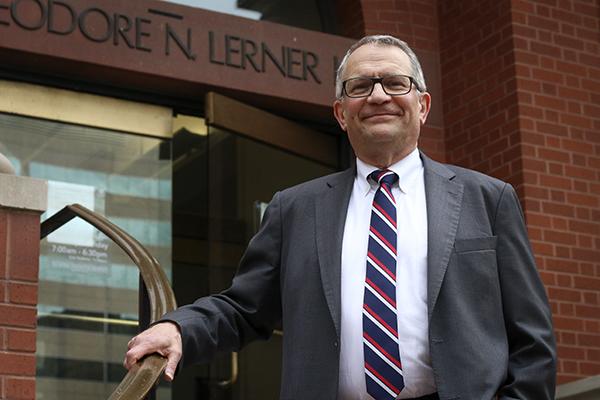Updated: Monday, Nov. 9, 2015 at 2:09 p.m.
GW’s law school is bringing on fewer faculty to replace retiring members, a strategy to keep the school’s costs low, a current faculty member said.
In recent years, the GW Law School has attempted to save money by hiring fewer faculty members and not hiring visiting professors when existing faculty go on sabbatical, current faculty members said. This low turnover has contributed to an aging faculty corps, with few young professors poised to take the place of older faculty if they retire.
Since January 2013, the law school has seen at least 11 professors leave full-time positions, but not all of them taught courses, and some served as professors at the school in other capacities such as running clinical experiences for students.
When a school’s budget is tight, the first area to see cuts is often faculty salaries. Faculty are a serious financial commitment for universities, and in times of hardship, new faculty will only be brought on if absolutely necessary. For example, hiring in the Columbian College of Arts and Sciences dropped off last fall amid University-wide budget problems.
Elizabeth Field, a spokeswoman for the law school, declined to comment on how many faculty have retired, how many plan to retire or extend sabbaticals, how the school replaces faculty who leave or how many faculty members they plan to hire in the upcoming year.
In the past, officials have turned to buyouts to bring young and research-minded faculty into aging departments. Officials offered a six-figure buyout to business school faculty last fall, and have also used buyouts in the engineering school and CCAS.
Orin Kerr, a professor of criminal procedure and computer crime law, said from the late 1990s to 2007, the law school was expanding and officials hired a large number of new faculty. But in the last five years, when fewer lawyers were being hired and the dean’s post went through a period of turnover, the law school has done relatively little hiring.
Dean Blake Morant started his tenure last year, coming to GW from Wake Forest University. Paul Schiff Berman, who stepped down from his position as vice provost of online education and academic innovation, will serve as a full-time law faculty member starting next fall. Before working in the provost’s office, he led the law school for 18 months.
Kerr said that in comparison to other nearby law schools like those at Georgetown and American universities, he finds GW law school faculty to be older on average.
“My sense is that we have an older faculty on average relative to other schools,” he said. “I think we now have two professors under the age of 40. Which, you know, that’s unusual.”
Joshua Schwartz, the co-director of the government procurement law program, said the decrease in hiring has led to a law school with limited growth.
“It’s like the field has kind of turned to molasses,” Schwartz said. “Nothing moves.”
The law school typically covers for professors on sabbatical by bringing visiting professors on board, but officials are now paying existing faculty a bonus to teach an extra class, he said.
“That’s a way of saving money and covering a course when someone’s on sabbatical or when, if we had the money, we’d hire an extra person. But we don’t, and it’s a pretty sensible choice,” Schwartz said.
Schwartz added that over the last year, the school needed two professors in two different areas, tax law and patent law, but only one of those professors was hired. In past years, when professors were needed to teach courses, Schwartz said the school had always managed to find a way to pay for them.
John Banzhaf, a professor of law, said hiring someone for a tenure track position – positions that many new faculty had been given in the past – is equivalent to constructing a $10 million building. Over their time at GW, a tenured professor will generally earn about $2 million in addition to having top job security.
“So if there’s a lot of money available, I think a dean is more likely to say, ‘Yeah, you know, let’s get five people.’ And other years he might say, ‘I’m not so sure,’” Banzhaf said.
But the faculty situation is not one unique to GW. Law schools across the country have faced financial difficulties because fewer students are joining law programs as the number of law firms hiring also declines.
Steven Halpert, a law professor at University of Miami’s law school, said he noticed a similar trend within University of Miami’s faculty. He said older, tenured faculty members were not retiring and new people were not being hired, so the school began offering buyouts to senior faculty members.
“We have made buyout offers to senior faculty who agree to retire and get a cash stipend when they leave,” Halpert said. “That has been successful in significantly reducing the population of very senior faculty members and providing opportunities to promote junior faculty and hire new junior faculty.”
Lawrence Baxter, a professor of law at Duke University’s law school, said top law schools are doing fine, boosted by a “flight to quality” that keeps their application numbers up while law school applications around the country are dwindling. He expected that the GW’s law school would be in that category.
“The schools that are in trouble are buying out their older faculty and the schools like Duke and others ‒ and I would have included GW in this ‒ are not being hit yet by the reduction in law school applications,” Baxter said.
Ellie Smith contributed reporting.
This post was updated to reflect the following correction:
Elizabeth Field’s last name was misspelled on first reference. It is Field, not Fields. We regret this error.







